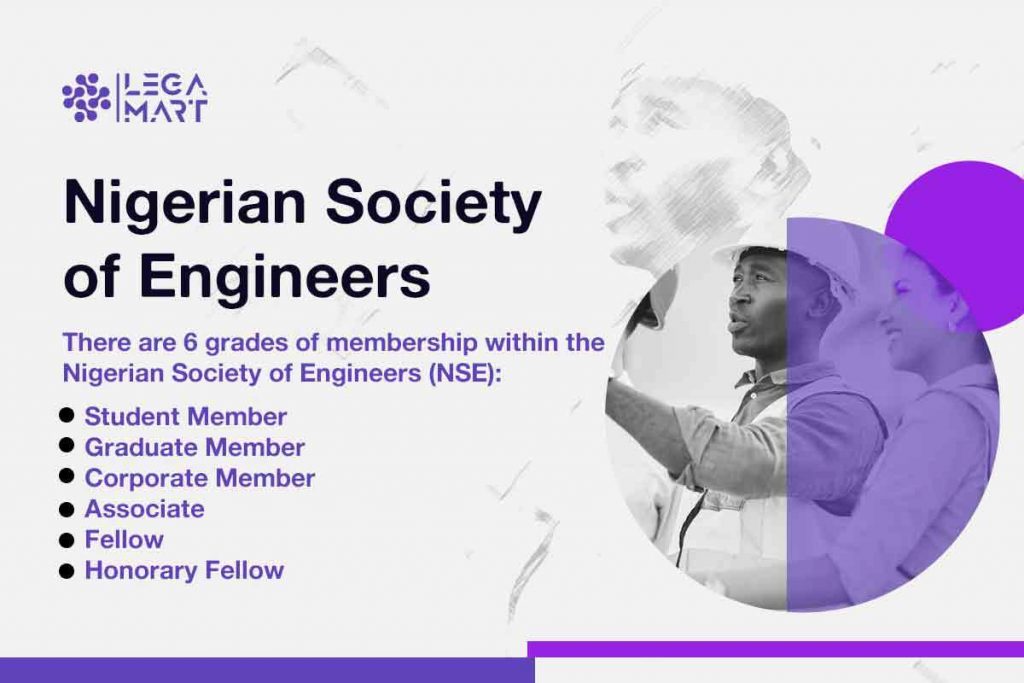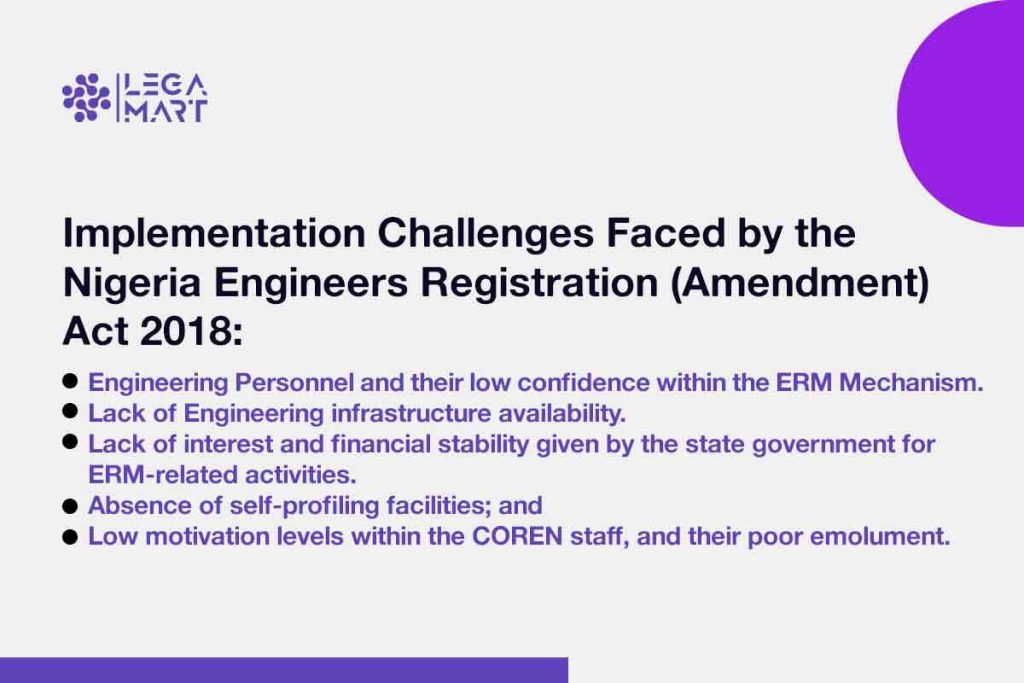Introduction
Foreign construction firms dominate the construction market in many developing countries and often source equipment, materials and labour from their home country. Consequently, locally owned contractors, consultants, material and equipment suppliers, and workers often do not benefit from the investment in the construction sector.
The Nigerian construction industry has registered quite a significant growth over the past few years, and output is expected to continue to grow so long as oil prices and government investments remain high.
However, the contribution of construction to GDP and employment is very low by international standards. This is mainly due to the domination of foreign construction firms in the construction market with equipment, materials and, in some cases, labour sources abroad.
In 2018, the Nigerian government passed into law the Engineers (Registration etc.) (Amendment) Act, 2018 (the “Engineers Act”). The provisions of the Engineers Act amend the Engineers (Registration, etc.) Act Cap E11 LFN 2004 (the “Principal Act”) to broaden the powers of the Council for Regulation of Engineering in Nigeria (“COREN“) in ensuring compliance and upholding international standards within the engineering profession.
The amendments to the act seek to ensure enhanced regulation of engineering practice (including foreign engineering practitioners) in Nigeria due to the growing incidence of collapsed buildings and other cases of engineering failures in the country.
In the past four years, it was reported that Nigeria has recorded over fifty-four collapsed buildings. Most of these decays were caused by the employment of unqualified engineers for building and engineering projects and the use of substandard materials in building and engineering projects.
The amendments also seek to ensure capacity building and local content development in the Nigerian engineering industry to increase Nigerian participation in the construction industry.
Overview of the Construction and Projects Sector in Nigeria
The Nigerian construction industry struggled in 2020, with output declining by 7.7% in real terms, owing to disruptions caused by the COVID-19 outbreak and the subsequent lockdown measures.
However, things have improved, considering that according to the National Bureau of Statistics (NBS), the Nigerian construction industry expanded by 11.6% year-on-year (YoY) in the third quarter of 2022. According to experts, the industry is expected to expand by 18.5% in 2023.
Nigerian Society of Engineers
The Nigerian Society of Engineers (NSE) is an umbrella organization for engineers in Nigeria. It was founded on 16 February 1958 by a group of young Nigerian Graduate Engineers and students in the United Kingdom and inaugurated at the Nigerian House in London.
NSE is registered with the Corporate Affairs Commission as a company limited by guarantee.

According to the NSE website, there are six grades of membership in NSE. They include:
- Student Member
- Graduate Member
- Corporate Member
- Associate
- Fellow
- Honorary Fellow
Membership Requirements for the Nigerian Society of Engineers
As mentioned above, there are six types of membership in the NSE:
Student Member
A person must be undergoing a regular course of study in Engineering Science of duration not less than three years in a University or Technical Institution whose curriculum is approved by the council in respect of Engineering Education.
Graduate Member
A person must have undergone a regular course of study in Engineering Science of a duration not less than three years in a University or Technical Institution whose curriculum is approved by the council and completed such a course successfully or satisfied the requirements of other Engineering Societies approved by the council in respect of Engineering Education.
Corporate Member
A Corporate member is eligible for all privileges of a member as prescribed by the council, is eligible to vote at the Annual General Meeting (AGM) and can aspire to any positions in the Society in line with the conditions as prescribed by the council. A Member can be moved to Fellowship Cadre upon application and fulfilling the conditions for the category.
Associate
A person must possess an academic qualification at the level of a University degree in the Sciences allied to engineering science or other qualifications approved by the Council of the Society. The person must have been engaged in work related to engineering practice for a minimum of five years.
Fellow
A Fellow of the Society is a distinguished membership category with all privileges of a member and other ones conferred by the Fellowship category as prescribed by the council. A Fellow is eligible to vote at the AGM and can aspire to any positions in the Society in line with the conditions as prescribed by the council.
A Fellow of the Society is recognized for valuable and selfless service to Society and is a widely acknowledged authority in his field.
Honorary Fellow
Honorary membership or affiliation is conferred on distinguished persons who have rendered assistance in the prospection of public works or are eminent in science and experienced in pursuits connected with the profession of Engineering.
Key Provisions of the Nigeria Engineers Registration (Amendment) Act 2018
Perhaps, the most significant amendment to the act is the requirement on COREN to ensure capacity building and monitoring of local content development in the Nigerian engineering industry. Therefore, COREN is required to ensure mandatory attachment of Nigerians to expatriate engineers on major projects to understudy from the inception of the project. COREN must attest to all expatriate quota applications for foreign engineering practitioners, including turnkey projects, that no qualified or competent Nigerian is available to undertake the work. The grant of expatriate quota will be contingent on the training of several such Nigerians as may be required to execute the work.
Also, foreign engineering firms, engaged in Nigerian projects are now required to establish their design office in Nigeria, and if a work permit is required by a foreign engineer, then the foreign engineer must register with COREN and obtain appropriate licenses, including practising licenses, as may be required.
The act makes it an offence for an unregistered/unlicensed engineering practitioner or organization to offer engineering consultancy on Nigerian projects, with the imposition of sanction upon conviction. If the offence relates to an unregistered organization, the organization will forfeit all proceeds of the transaction to the Federal Government of Nigeria. In the case of an unlicensed engineering practitioner, he may be fined five times the annual fees of the license.
Implementation Challenges faced by the act

Even though the amendment has been a welcome change in many aspects, there are still some aspects that the amendment fails to consider. For instance, the defects present in the principal act, such as the treatment of engineering as a single profession/discipline, the kind of representation of members from non-engineering backgrounds, the controlling power over the Parliament by the Minister, are some things which the amendment has not cured. The Engineering Regulation Monitoring (ERM) environment created by the COREN further faces some implementation issues, including but not limited to:
- Engineering Personnel and their low confidence in the ERM Mechanism.
- Lack of Engineering infrastructure availability.
- Lack of interest and financial stability given by the state government for ERM-related activities.
- Absence of self-profiling facilities; and
- Low motivation levels within the COREN staff and their poor emolument.
Therefore, it is unlikely for the effectiveness and efficiency of regulations, registrations, and advancement processes, to improve within the engineering practice of Nigeria. It might not be wrong to conclude that the amendment has failed to improve the basic issues in Nigeria’s engineering practice. Hence, the amendments do not improve and strengthen the professional engineering environment in the country.
Improvement Recommendations
Currently, the name of Nigeria’s professional engineering institution is the Nigerian Society of Engineers. This institution is responsible for promotion, registration, regulation, advancement, and discipline among professional members. There are 26 professional engineering institutions present within this organization, as has also been mentioned under Section 10 of the Act.
The internationally preferred and accepted best practice includes the self-regulation functions of the different professional institutions. This can be provided under a central charter, which may include conditions such as membership requirements of at least 5000, provided that 70% of 5000 have the qualifications of a first university degree.
This can further be supported through the help of various other professional engineering affiliate institutions of Nigeria, such as the Nigerian Academy of Engineering, Business Associations like the Association of Consulting Engineering (ACEN), Association of Professional Women Engineers in Nigeria (APWEN), the Federation of Construction Industry (FOCI), and others.
Conclusion
The newly introduced amendment is laudable as it broadens the power of COREN to properly regulate engineering practice in Nigeria. The requirement for registration is designed to protect the public and raise the standard of services provided by engineers. It ensures that inexperienced or non-qualified engineers are not permitted to perform engineering work in Nigeria. If properly enforced, engineering services will be provided by registered professional engineers with the requisite skills and competence, reducing the incidence of engineering failure in projects executed in Nigeria.
Also, foreign engineering firms engaged in the engineering and design of a Nigerian project must now maintain a local office in Nigeria, even though the work may not require an actual presence in Nigeria. The objective is to ensure that COREN provides oversight over the activities of foreign engineering firms involved in Nigerian projects. However, it is difficult to see how this provision will be implemented in practice since COREN is not involved during the contract bidding phase to ensure foreign engineering and consultancy firms follow the requirements of the act.
The amendment seeks to achieve local content development in the Nigerian engineering industry through capacity building and training. However, it does not prescribe clear obligations and conditions for training and skill development to ensure a fully developed capacity of the Nigerian workforce. The ownership of the responsibility should be established, and effective strategies enacted to grow capacity and monitor compliance.
Also, there are no express requirements that comprehensively prescribe the increased participation of Nigerians in the construction industry, including the provision of quantifiable targets for Nigerian content. There is, therefore, a need to enact an Act to provide for local content development that reflects the characteristics of the construction industry to ensure increased Nigerian participation in the construction industry and in the economy’s overall growth.
If you want to know more about this act or looking to hire a Nigerian lawyer to handle any of your cases related injuries caused by engineering failures, then LegaMart is the place to go. From online consultation to court representation, LegaMart will help you with all your questions and concerns.




